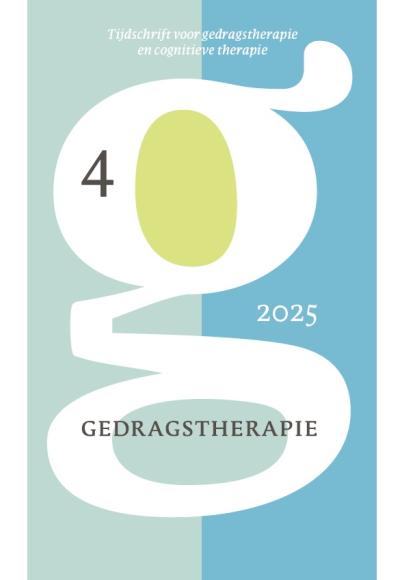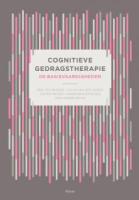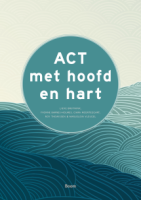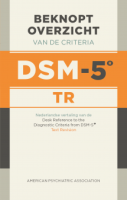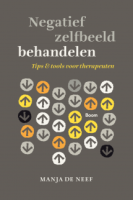Inhoud
Angstbehandeling bij patienten met een comorbide persoonlijkheidsstoornis
Samenvatting
Een wijdverbreid en hardnekkig misverstand is dat een comorbide persoonlijkheidsstoornis een klachtgerichte angstbehandeling stagneert. Gecontroleerd onderzoek in een onderzoeksetting vindt namelijk geen bewijs voor deze stelling. Echter in een klinische setting is mogelijk meer ruimte voor de ‘therapist drift’ (de neiging te gaan praten in plaats van CGT technieken te gebruiken) dan in een onderzoeksetting. Wanneer het basis arsenaal van een CGT therapeut tekort schiet om vat te krijgen op deze ‘therapist drift’ kunnen technieken uit de schematherapie helpen de angstbehandeling te continueren.
Literatuur
- Becker, C.B., Zayfert, C., & Anderson, E. (2004). A survey of psychologists' attitudes towards and utilization of exposure therapy for PTSD. Behaviour Research and Therapy, 42, 277-292.
- Dreessen, L., & Arntz, A. (1999). Personality disorders have no excessively negative impact on therapist-rated therapy process in the cognitive and behavioural treatment of Axis I anxiety disorders. Clinical Psychology & Psychotherapy, 6, 384-394.
- Dreessen, L., Arntz, A., Luttels, C., & Sallaerts, S. (1994). Personality disorders do not influence the results of cognitive behavior therapies for anxiety disorders. Comprehensive Psychiatry, 35, 265-274.
- Emmelkamp, P.M.G. (2011). Zijn de resultaten van randomized clinical trails (RCT's) generaliseerbaar naar de klinische praktijk? Gedragstherapie, 44, 263-276.
- Friborg, O., Martinussen, M., Kaiser, S., Øvergård, K.T., & Rosenvinge, J.H. (2012). Comorbidity of personality disorders in anxiety disorders: A meta-analysis of 30 years of research. Journal of Affective Disorders, 145, 143-155.
- Hofmann, S.G., & Suvak, M. (2006). Treatment attrition during group therapy for social phobia. Journal of Anxiety Disorders, 20, 961-972.
- Hout, M. van den, Brouwers, C., & Oomen, J. (2006). Clinically Diagnosed Axis II Co-Morbidity and the Short Term Outcome of cbt for Axis I Disorders. Clinical Psychology & Psychotherapy, 13, 56-63.
- Kampman, M., Keijsers, G.P.J., Hoogduin, C.A.L., & Hendriks, G.J. (2008). Outcome prediction of cognitive behaviour therapy for panic disorder: Initial symptom severity is predictive for treatment outcome, comorbid anxiety or depressive disorder, cluster c personality disorders and initial motivation are not. Behavioural and Cognitive Psychotherapy, 36, 99-112.
- Olatunji, B.O., Cisler, J.M., & Tolin, D.F. (2010). A meta-analysis of the influence of comorbidity on treatment outcome in the anxiety disorders. Clinical Psychology Review, 30, 642-654.
- Swift, J.K., & Greenberg, R.P. (2012). Premature discontinuation in adult psychotherapy: A meta-analysis. Journal of Consulting and Clinical Psychology, 80, 547-559.
- Telch, M.J., Kamphuis, J.H., & Schmidt, N.B. (2011). The effects of comorbid personality disorders on cognitive behavioral treatment for panic disorder. Journal of Psychiatric Research, 45, 469-474.
- Van Velzen, C.J.M., Emmelkamp, P.M.G., & Scholing, A. (1997). The impact of personality disorders on behavioral treatment outcome for social phobia. Behaviour Research and Therapy, 35, 889-900.
- Vos, S., Arntz, A., & Huibers, M.(submitted). Effectiveness of cognitive-behavioral therapy for anxiety disorders and predictors of treatment outcome: results from 15 randomized clinical trials.
- Waller, G. (2009). Evidence-based treatment and therapist drift. Behaviour Research and Therapy, 47,119-127.
- Weertman, A., Arntz, A., & Kerkhofs, M. (2000). Gestructureerd Klinisch Interview voor DSM-IV As-II Persoonlijkheidsstoornissen. Lisse: Swets test publishers.
- Weertman, A., Arntz, A., Schouten, E., & Dreessen, L. (2005). Influences of beliefs and per sonality disorders on treatment outcome in anxiety patients. Journal of Consulting and Clinical Psychology, 73, 936-944.
 © 2009-2026 Uitgeverij Boom Amsterdam
© 2009-2026 Uitgeverij Boom Amsterdam
De artikelen uit de (online)tijdschriften van Uitgeverij Boom zijn auteursrechtelijk beschermd. U kunt er natuurlijk uit citeren (voorzien van een bronvermelding) maar voor reproductie in welke vorm dan ook moet toestemming aan de uitgever worden gevraagd:
Behoudens de in of krachtens de Auteurswet van 1912 gestelde uitzonderingen mag niets uit deze uitgave worden verveelvoudigd, opgeslagen in een geautomatiseerd gegevensbestand, of openbaar gemaakt, in enige vorm of op enige wijze, hetzij elektronisch, mechanisch door fotokopieën, opnamen of enig andere manier, zonder voorafgaande schriftelijke toestemming van de uitgever.
Voor zover het maken van kopieën uit deze uitgave is toegestaan op grond van artikelen 16h t/m 16m Auteurswet 1912 jo. Besluit van 27 november 2002, Stb 575, dient men de daarvoor wettelijk verschuldigde vergoeding te voldoen aan de Stichting Reprorecht te Hoofddorp (postbus 3060, 2130 KB, www.reprorecht.nl) of contact op te nemen met de uitgever voor het treffen van een rechtstreekse regeling in de zin van art. 16l, vijfde lid, Auteurswet 1912.
Voor het overnemen van gedeelte(n) uit deze uitgave in bloemlezingen, readers en andere compilatiewerken (artikel 16, Auteurswet 1912) kan men zich wenden tot de Stichting PRO (Stichting Publicatie- en Reproductierechten, postbus 3060, 2130 KB Hoofddorp, www.cedar.nl/pro).
No part of this book may be reproduced in any way whatsoever without the written permission of the publisher.
Inloggen VGCt en VVGT
Leden van de VGCt en de VVGT loggen in via de site van hun vereniging. Als u op die site bent ingelogd als lid, vindt u daar een button naar het Tijdschrift voor Gedragstherapie.
English
Behavioral Therapy: Journal for Behavioral Therapy and Cognitive Therapy ISSN 0167-7454
Information in English can be found here.



